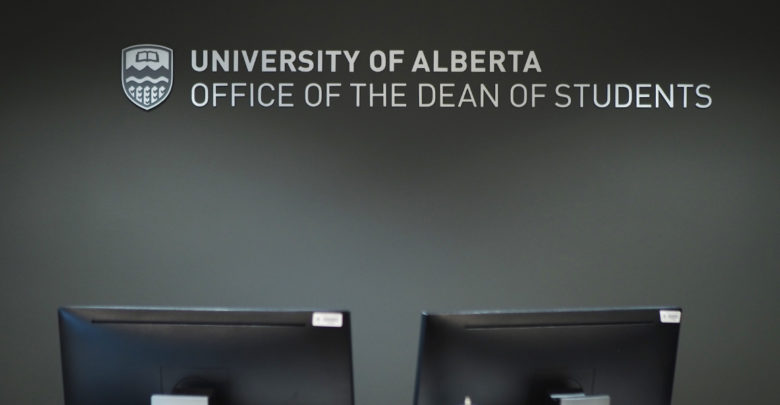Donations fuel support for mental health initiatives at U of A
According to Meldrum, it takes a minimum of $1 million to fund initiatives dealing with mental health. The dean of students relies on donations to help support these efforts
 Helen Zhang
Helen ZhangMost students have seen the posters or advertisements on TVs around campus promoting mental health initiatives or events like dogs visiting libraries, or workshops on mental health literacy.
The funding for these, and other mental health initiatives, is made up of government grants, university funding, and donations from the public.
Bryce Meldrum, managing director of advancement for the office of the dean of students, is a major gifts fundraiser at the university who responds to requests for donations and also actively seeks new partnerships for future donations from corporations or individuals.
He described his job as matching donors with initiatives the dean of students is undertaking, and ultimately bringing additional funds for the betterment of student life on campus.
“Donations go along way,” he said. “It is one of the ways the greater university community can help current students while leaving a lasting impact.”
The main services offered by the dean of students include:
- Student counselling
- ACCESS Outreach Team, which supports academic and wellness drop-in support;
- Dogs in the Library;
- Unwind Your Mind, which provides wellness activities during exam season;
- Mental health workshops
- Days of Action
- Heroes for Health, a service giving grants for student-run wellness initiatives
- Welltrack, a free health and wellness support app
- General mental health promotion, through TV ads in the Students’ Union Building and posters across campus
“The university provides lots of services to students,” he said. “The role of advancement in the office of the dean of students is relatively new. We saw an opportunity to help these services by building relationships with donors, and making sure anyone who wanted to help by donating could in fact do so.”
In Meldrum’s view, having a full-time fundraiser in the dean of students office allows for the opportunity to enhance programming. When looking at the donations given overall, Meldrum said alumni of the U of A make up the largest portion.
“While that’s not the only source for donations, [they are] one of the major sources,” Meldrum said.
“Alumni were once students. They know what it is like to be a student,” he said. “They have seen how the student experience has drastically changed over the last few years… Mental health is something students have always had to dealt with. They relate to the needs of the portfolio.”
For Meldrum, a lot of these initiatives allow for grass-roots mental health activities and supports to begin. He gave the example of the Heroes for Health grant, which is supported by donations, as enabling university activities to be funded. Some of the grant went towards funding the rehabilitation medicine students calm room.
Another initiative mental health donations from the community helped support was a series of mental health vlogs produced by students as part of the Peter Lougheed Leadership College. Historically, the PLLC created short documentary videos on a wide range of social issues. The funding from the dean of students has allowed a project focusing solely on mental health to be released to the entire U of A campus through a targeted campaign.
“This will be a university-wide resource available to the campus community,” he said. “This will allow them to be used for now, and for future students.”
Meldrum said that it takes a minimum of $1 million to sustain all the vital services the dean of students offers in a year. For him, philanthropy helps this while also giving the opportunity to potentially expand services.
There are two primary funds the dean of students uses to support mental health initiatives. One is the Student Mental Health Fund, which is a general spending fund. This means donations to the fund are spent by through the discretion of the dean.
From numbers provided by Meldrum, during 2019, $94,119 was raised from donors that went towards funding initiatives for the dean of students.
The second fund was created in 2015 by Ralph Young, a member of the U of A senate, as an endowment. This means the principle, the actual donated amount of money, is held in perpetuity by the U of A. Only the interest or investment income made every year is spent. Young created the endowment to support existing mental health resources provided by the dean of students.
The U of A Senate Student Mental Health Endowment has an initial value of $226,263. With market value, which includes interest growth, the fund sits at approximately $251,000.
Meldrum said the amount of support donations offer to dean of students initiatives varies from year to year.
“[This] depends on the funding landscape,” he said. “Some years there are gifts given or many donations. Sometimes there are less.”




